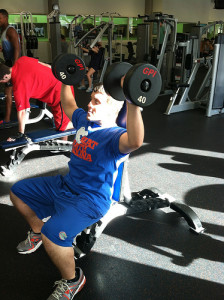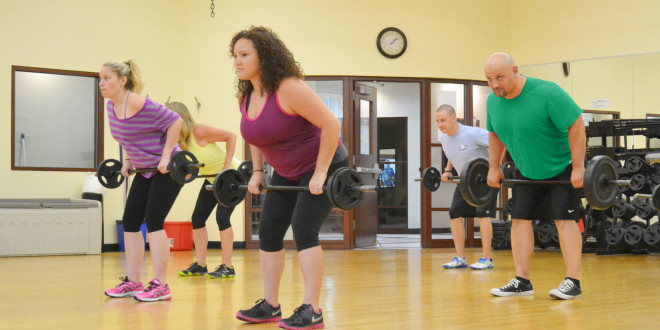by Michelle Sutton-Kerchner
Increase fitness success when you embark on the journey for the right reasons …
There really aren’t any wrong reasons to exercise. Maybe your belt buckle dug in all day, or you simply wanted to avoid an annoying guest parked in your living room. Whatever it takes to get you moving! There are, however, reasons that promise a more favorable outcome for a long-term commitment to workouts.
Make Health, Not Size, the Priority

Exercise for weight loss tops the list of many. Wanting to achieve and maintain a healthy weight is a super reason to hit the Exercise Floor. Striving to resemble a lifeguard model signifies the need for a teeny reality check. Exercise can help us look and feel good, simultaneously boosting self-confidence and biceps. However, to stay motivated, the goal must encompass more than achieving a dream body.
Each person, every body, needs exercise. Perhaps some need more than others at various stages of life. To sustain a fitness program, recognize workouts as more than a means to fit into a smaller size. Even those of a healthy weight need to exercise.
Weight loss goals take time. Ask anyone who has shed unwanted pounds. Maintaining weight loss takes commitment. The best way to achieve that commitment is to forget quick-fixes and scale monitoring. Redirect the focus away from weight loss so you more easily notice other benefits of a good workout. If you struggle to meet weight loss goals in your timeframe, you still will have a plethora of other reasons to keep on sweating. Improve your lifestyle, with exercise and other healthy habits, because it is good for your physical and mental well-being.
When the focus is on external results (for example, flat abs), research proves success rate drops. Flexing your willpower muscle is easier when done for internal benefits, such as stress reduction, better cholesterol, or improved energy levels. Perhaps we tend to be more patient with ourselves when health is a motivator rather than a pair of skinny jeans.
Get Personal
Find your internal reasons and put them to work for your workout! Consider these healthy and uplifting suggestions:
Exercise to Encourage Healthy Eating: No one wants to wreck a hearty workout with a hearty serving of junk food. Even fitness professionals admit to working out so they can better enjoy food indulgences. The difference between them and the questionable exerciser: Limits.

Exercise cannot compensate for a sweet-tooth or poor diet. Often, a workout’s caloric burn is overestimated. It takes a lot more treadmill time than we may think to cancel out the average treat fest, or even a slice of pepperoni pizza. A fit body can accomplish many feats. A junk food makeover is not one of them. We thrive on foods packed with vitamins and minerals. They improve workouts, and nurture physical and mental health.
Enjoy the occasional treat, but not necessarily because you “earned” it on the Exercise Floor.
Exercise to Feel Better: When we feel good, it shows. There is nothing wrong with exercising to enhance appearance. But, physique cannot improve overnight. Remaining faithful to healthy habits leads to better health. Nothing makes a smile brighter, a face more radiant, or stature more confident than feeling healthy. It quickly shows in how you carry yourself and interact with others. Over time, it shows in clothes size.
When it feels too cold outside to surface from under the blankets, obtaining lower blood pressure or a healthy dose of energy is more motivating than fitting into last year’s swim suit. Pick motivators based on the here and now, rooted in lifelong gains. In other words, that swim suit won’t mean anything 10 years from now. A healthy heart and productive life will.
Exercise to Sleep Better, Not Less: Exercise is not a permission slip to eat junk food, as we established. It also does not grant permission to reduce sleep. Cutting Zzzs short to hit the Center does not make it okay. Sure, exercise can give you a boost on a tired day. It is a great temporary fix for the occasional late night. It helps when suffering chronic sleep deprivation (from new parenthood, a work situation, or other life event). As the regular solution to energize a body “abused” by addiction to late shows or Facebook, a workout can further stress the body.
Sleep deprivation is proven to have many detrimental effects on health. It can increase the chance of obesity, diabetes, and heart disease. There is a direct connection between lack of sleep and weight gain. It also affects how you perform your workout, leaving you vulnerable for injury. Muscles may breakdown and become weak when the body reacts to exercise as stress, which can happen when regularly sleep deprived.
Exercise to improve sleep quality, not replace sleep quantity. Strive for seven to eight hours nightly. Manage your workout during the other 16 or so hours of your day. You will reap the rewards of a great fitness session and better sleep. Your need to exercise will be less about trying to compensate for a sleep deficit and more about reaching healthy goals.
Exercise for Your Brain: Studies have found a direct correlation between IQ and one’s level of fitness. An undeniable link between physical fitness and IQ was discovered: the higher the former, the higher the latter. Test areas focused on logical thinking and verbal comprehension were particularly strong.
A workout that involves the body’s large muscle groups increases neuron production, the cells that process and transmit information. This increase helps the brain function, including when learning new material.
Studies show long-term effects can be seen by a reduction in the incidence of Alzheimer’s disease and dementia in physically active populations. Credit is given to exercise’s ability to increase the size of the brain’s frontal lobe. The benefits to the frontal lobe directly combat the age-related decline often accelerated in that area. Physical fitness also helps this powerful organ form connections.

The study also determined a high level of physical fitness at 18 years old increases the chance of achieving above-average educational and professional goals throughout life. Hit the Center before a test or presentation, and enjoy an immediate boost in brain power following. This beyond-the-bicep benefit remains effective for about three hours after a workout. Add a workout to your academic or career agenda and possibly accelerate your success.
Aside from the potential for added smarts, an invigorating workout burns stress and improves mental outlook. Sometimes the heaviest weight to lift is a down mood. Aerobic and strength training help lift the weight of depression, anxiety, and every day stress. The emotional relief sometimes can be immediate.
For Your Health
The timeless top reason to exercise is, and forever will remain, to be healthy. Fitness is essential for better living. Everyone needs their own personal set of motivators to exercise. Some of the many are shared here. Discover what you need from exercise. Is it listed above? Do you simply need an outlet for making new friends? A non-medical way to lower cholesterol? Decrease the chance of osteoporosis you inherited?
Make these positive, personal motivators yours. Top them off with the ultimate reason for anyone to get moving– to be healthy. A body in motion stays in motion, no matter the size.
Use exercise to take care of yourself. It is not a punishment for overeating. It is not a remedy for skimping on sleep. It is a way to be your strongest, healthiest self. It complements all other efforts to feel and look your best. And when those other efforts are lacking, it inspires their possibility.
Sources
“Are You Exercising for the Right Reasons?” by Melinda Johnson at www.usnews.com.
Proceedings of the National Academy of Sciences
Image Credits
Self-portrait with camera: © Darren Green at www.dreamstime.com
Eat healthy: www.flickr.com/photos/57855362@N06/6785325256/ (Photo by Adrian Michael)
Young exerciser: www.flickr.com/photos/89024210@N05/8114108303/ (Photo by Mcadigan)
 Fitness & Wellness News Your Source for Fitness News, Wellness News, Health News, and Nutrition News!
Fitness & Wellness News Your Source for Fitness News, Wellness News, Health News, and Nutrition News!




